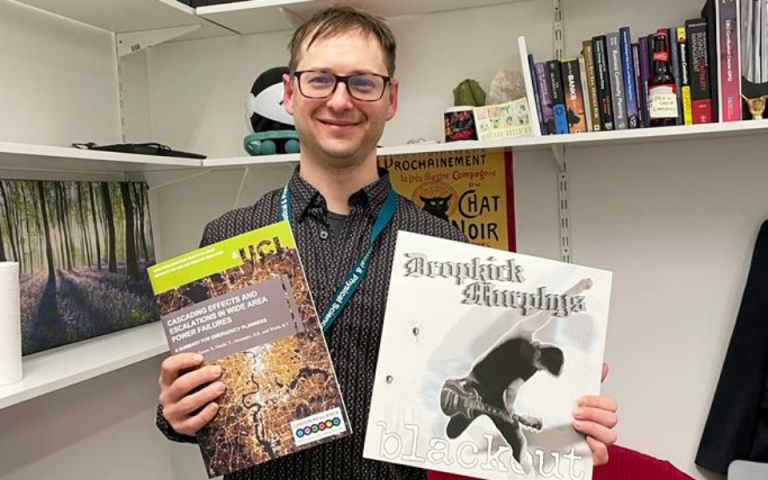Dr Gianluca Pescaroli
Dr Gianluca Pescaroli is a Lecturer in Business Continuity and Organisational Resilience at the Institute for Risk and Disaster Reduction, and Director of the MSc in Risk, Disaster and Resilience.

1 May 2022
When did you take up this position? What was your position beforehand?
I started this position in October 2018, before I was doing the doctorate in the same department. The job interview was the day after my doctoral Viva. I had to delete another couple of things scheduled the week afterwards.
When did you join UCL and where were you before?
I joined UCL in the spring of 2014. I always wanted to be in academia, but I had a strange professional path. I did everything, from working in a factory to security and journalism. The last two years before coming to London, I worked in a bakery; I’ve worked for a Non-Governmental Organisation in Port Au Prince (Haiti) for three months; and as a research fellow on at the University of Bologna.
I got a PhD study offer one week before starting a bartender job. I still bring back all my glasses in pubs because I could be on the other side of that counter. And I still bake a great focaccia.
Tell us about your work at UCL - how do you spend your days, and what makes your role different to similar positions elsewhere?
I work in an applied sector with the goal of improving the management of disasters and increasing societal resilience. I do not need much data processing capacity, but I need more lateral thinking, creativity and a good coffee machine.
An essential part of the job is building relations: I spend A LOT of time talking with my stakeholders, listening to their needs, learning from them, and checking how I can help.
UCL also gives me academic freedom: I can afford to keep my chain when I am dressing up with a suit for meetings and I created a soundtrack for both my modules, from London Calling to the Imperial March.
One of my old achievements is a paper that is titled “The M.OR.D.OR. Scenario” that was inspired by a bet with a friend in Earth Sciences. Best dinner of my life.
A month ago, I persuaded a BBC journalist to buy an emergency hand crank torch and a radio, so something good is still going on.
What are some of your favourite things about working in the department? How have you found it different to previous jobs?
In 2014 I was given the opportunity to be in the front line for creating a new field. If compared to my previous role in academia, I got praised for the same reasons I was having troubles in Italy.
The other thing that I love in the department is that many of us are good friends, not just colleagues. Human relations make such a massive difference in choices.
Can you tell us about any upcoming research, or future projects that you’re looking forward to working on?
Keeping research ongoing has been very challenging in the last two years so I accumulated a massive delay. The most important thing I am focusing on is the partnership with the United Nations Office for Disaster Risk Reduction on developing stress testing for critical infrastructure resilience. There are a lot of public and private stakeholders involved, and in March I have been in Boston and Virginia to speak about these topics.
In May, I will visit the colleagues of the Tohoku University in Sendai for following up activities on cascading risk. I also have a project ongoing with the University of Bergen (Norway) and the Greater London Authority on emergency response to concurrencies, and I am engaging with Prepared International on continuity management for the third sector.
I have a discussion on bridging management and disaster reduction with colleagues in Germany and Belgium, and I am trying to finish some work with Professor Carmine Galasso here at UCL on earthquake early warning systems in organisations.
I have other ideas, including the cascading effects of outer space exploration with colleagues in the US... But I need to go back to writing grants.
Finally, tell us about your non-work life. Do you have any hobbies, or favourite places to go in London?
There is a tendency to miss work-life balance in academia. I disciplined myself again to exercise the White Crane, a traditional kung fu style you probably have seen in “kung fu panda”. I started it nearly 15 years ago and I am still meeting my Sifu in Italy whenever I go home. I will teach it at some point.
I also love to listen to my turntable and see live gigs. My favourite spots remain the Underworld and the Fiddler’s Elbow in Camden, the Alma in Newington Green, and the Finsbury in Manor House. I know it sounds strange, but I missed terribly mosh pits during Covid.
Finally, I realised I can go hiking outside of London or in the Italian Apennines to hide from emails. If my automatic answer says I am on my way to Mars, you know where to find me.
 Close
Close

